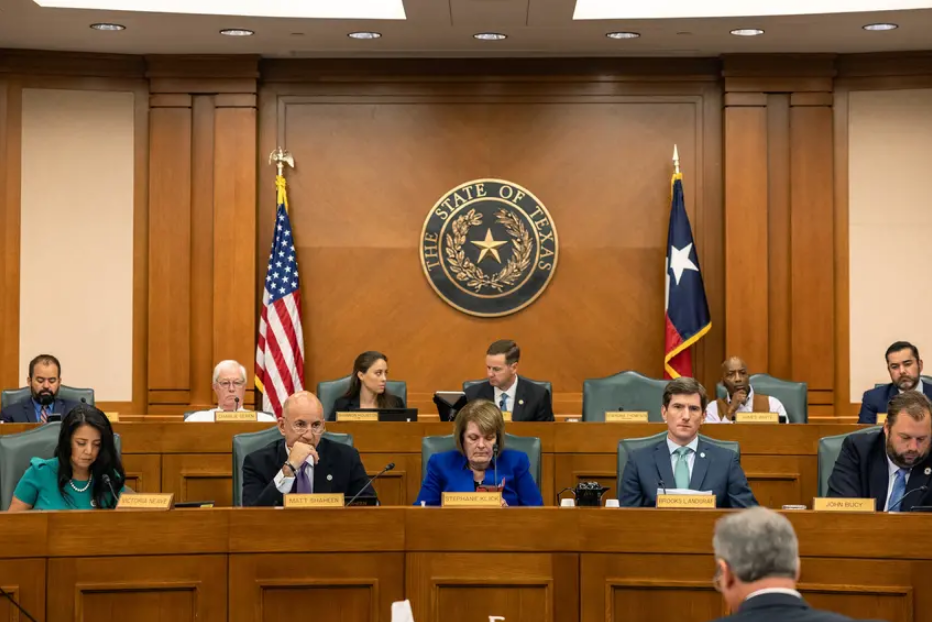House and Senate committees advance GOP bail legislation, as Democrats warn bills could lead to mass detentions

Days into a short legislative session, Texas lawmakers are moving quickly to pass a GOP priority bill that would make it harder for some people who have been arrested but not convicted to bond out of jail without putting up cash.
Legislators in the House and Senate filed matching bills to change state bail practices earlier this week, echoing legislation that failed to pass in the regular session. On Saturday, committees in both chambers approved the bills and sent them to the full chambers after nearly three hours of debate in the Senate and nine hours in the House.
The sweeping bail legislation would change how and if people can be released from jail before their criminal cases are resolved, while they are still legally presumed innocent. The bill would ban the release of those accused of violent crimes unless they had enough cash, as well as restrict charitable groups’ ability to pay to get people out of jail.
While the two Democrats on the Senate committee supported Senate Bill 6, House Democrats down the hall spoke out strongly against the identical House Bill 2, arguing it would lead to mass detention disproportionately affecting people of color, and it would create an overreliance on money in Texas’ pretrial system that is unfair to people who are poor. Both chambers of the Texas Legislature have a Republican majority.
During the hearings, the Republican bill authors, crime victims and their supporters argued new bail laws are needed to keep dangerous people behind bars before their trials, pointing to rising crime rates and numerous examples of defendants accused of violent crimes having been released from jail on bond and then accused of new crimes.
Bill supporters have also fought against the increase in courts releasing defendants on personal bonds, which don’t require them to have cash to get out of jail but can include restrictions like GPS ankle monitoring or routine drug testing.
“SB 6 is legislation which is really a direct response to the increase in violent and habitual offenders being released on personal bonds along with low-cash bonds,” State Sen. Joan Huffman, a Houston Republican and author of the bill said Saturday. “We have failed our communities, we have failed our citizens, definitely we have failed the victims, and it’s time to do something about it.”
House Democrats and civil rights advocates opposing the legislation took aim at the bills’ continued reliance on cash bail, noting that it primarily penalizes low-income people.
“What does ability to post a cash bond, how does that make a community safe?” questioned state Rep. Joe Moody, D-El Paso, who leads the House Criminal Justice Reform Caucus. “The bill pushes more people into the cash bail system by precluding their ability to have a personal bond in a laundry list of situations.”
In Texas, almost everyone who is arrested has a constitutional right to be released on bail. The current exceptions are capital murder defendants or people accused of certain repeat felonies or bail violations.
After someone is accused of a crime and arrested, courts set bail by deciding what restrictions are needed to release the person before their criminal case is resolved. The bail release system has two key goals: protecting public safety and ensuring defendants come back for their court dates.
Often in Texas, like many states, the possibility of being released while awaiting trial comes down to a dollar amount. If the defendant can post an assigned cash bail amount, or pay a nonrefundable percentage to a private bail bonds company, then they can usually walk free.
House Democrats also criticized the provision limiting charitable groups’ ability to post bond for criminal defendants. Such organizations became popular after they bailed out protesters arrested during the unrest after a police officer murdered George Floyd. SB 6 and HB 2 would prevent the groups from posting bond for people accused — or ever previously convicted — of a violent crime. Any group could still post bail for up to three people every six months, and religious organizations would be exempt from the restriction.
In the Senate, Huffman dismissed criticism that the measure would lead to mass detention, saying it put in place a process for defendants to say they could not afford their bond and instructed judges to use the least restrictive bail conditions. But Democrats and civil rights advocates said the lengthy form arrestees would need to fill out in jail to declare indigency is overly burdensome, requiring information on tax expenses, noncash assets and debts under penalty of perjury.
“SB 6 is trying very hard to keep the most serious violent offenders away from our communities until they can have their trial,” Huffman said at the hearing. “On the other hand, it is very cognizant of low-level, low-risk offenders, that there needs to be the least restrictive means used to ensure their appearance in court.”
While portions of the bills have drawn sharp division, others are less controversial. For example, the bills would require more judicial training on bail setting and provide more information to court officers who are setting bail, like a defendant’s criminal history.
Still, Democrats and civil rights advocates say that the GOP bail legislation is a move in the wrong direction and would exacerbate systemic racism in the Texas criminal justice system, where Black men are disproportionately arrested and imprisoned.
“We’re going to double down on those errors of the past,” Moody said. “We have done an immense amount of work in this body to try to turn the corner on those things, to try to promote liberty, to look at restorative justice … This is going to take us backwards.”
For years, civil rights groups and federal courts nationwide and in Texas have scrutinized bail systems’ reliance on cash. In Harris and Dallas counties, federal courts ordered changes to bail practices ruled unconstitutional because they led to the systematic detention of people who haven’t been convicted of a crime simply because they were poor.
In an ongoing federal lawsuit in Houston, civil rights attorneys pointed to the case of Preston Chaney, a 64-year-old man who caught the coronavirus in the Harris County jail and died. He’d been kept in jail for months, accused of stealing lawn equipment and meat from a garage. If he’d been able to pay about $100, he could have walked out of jail shortly after his arrest.
But Gov. Greg Abbott and other Republicans say bail changes are urgently needed instead to keep more defendants behind bars, citing examples of violent crimes committed by those who were out of jail on bond. Abbott began to call for bail changes after Texas state trooper Damon Allen was killed during a 2017 traffic stop. The suspect was out of jail on a $15,000 bond at the time, and the court official who set his bail later said he would have set the dollar amount higher if he had known the man had previously been accused of assaulting a Smith County deputy.
Harris County Republicans have also pointed to violent crimes allegedly committed by those out on bond, with some defendants having posted a high bail amount to be released and others being released on personal bonds. At the Capitol, people whose loved ones were killed questioned how the suspect could have been released on bond.
That included Melanie Infinger, whose 20-year-old pregnant daughter, Caitlynne, was killed in 2019, allegedly by her estranged husband. He had been released on a personal bond after being accused of assaulting Caitlynne, according to court records. He had been out on bond for an intoxicated driving charge when the assault occurred.
“[Caitlynne] reassured me that there was no way that he was going to get out because … he’s facing a felony and multiple misdemeanors,” Infinger said Saturday before lawmakers.. “Harris County, the very system that promised to protect my daughter, was responsible for her murder.”
HB 2 and SB 6 are similar, but not identical, to the final version of the bail bill that failed to pass earlier this year after House Democrats walked out of the chamber to kill a GOP voting measure. After the regular legislative session ended in May, Abbott vowed to bring lawmakers back to the state Capitol for a special session to pass bail and voting legislation.
Along with the priority bail bills, the two committees also approved related resolutions to allow courts to more often deny the release from jail outright in some violent cases. If passed, the resolutions would amend the Texas Constitution if approved by voters in November. But measures to change the Constitution must pass with a two-thirds majority — which requires Democrats to join Republicans on the bill.
This article was originally posted on House and Senate committees advance GOP bail legislation, as Democrats warn bills could lead to mass detentions





